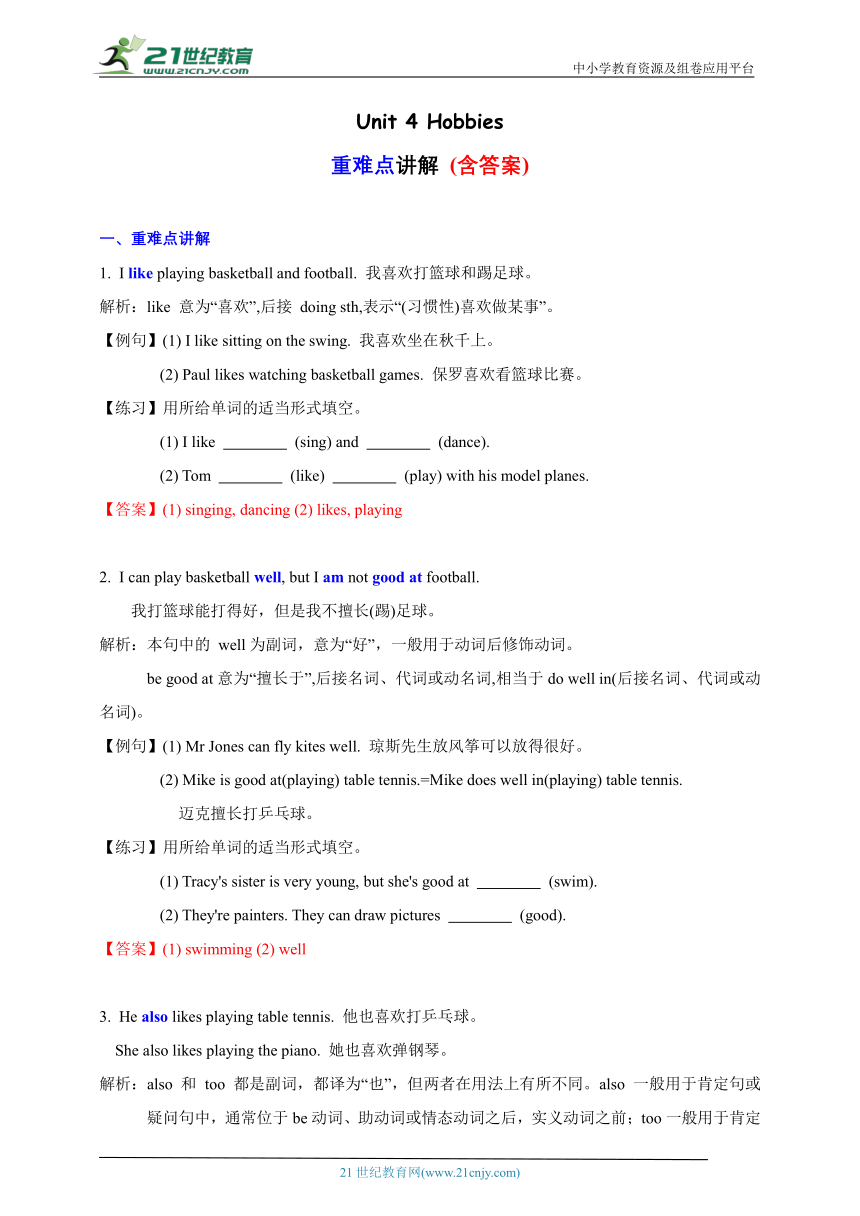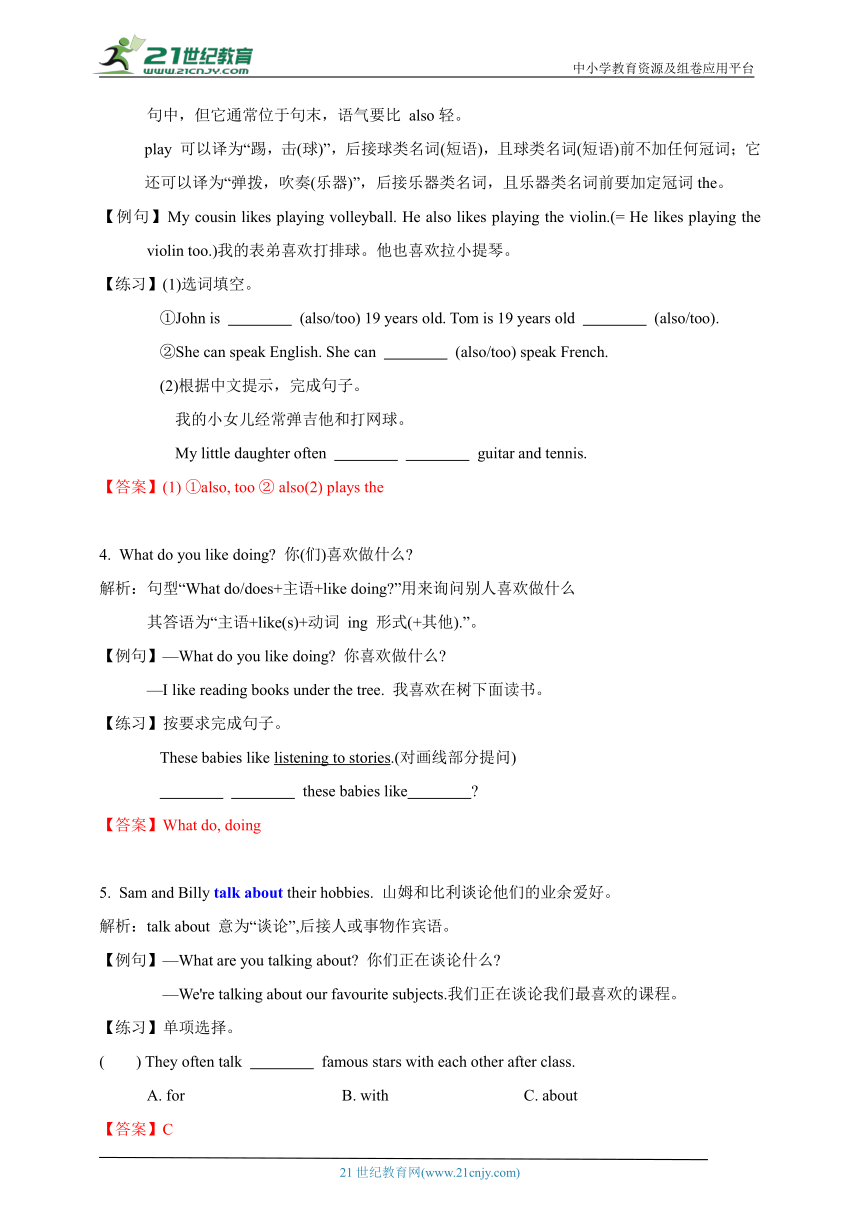Unit 4 Hobbies重难知识点(复习讲义)(含答案)
文档属性
| 名称 | Unit 4 Hobbies重难知识点(复习讲义)(含答案) |

|
|
| 格式 | doc | ||
| 文件大小 | 1.3MB | ||
| 资源类型 | 试卷 | ||
| 版本资源 | 牛津译林版 | ||
| 科目 | 英语 | ||
| 更新时间 | 2023-09-12 18:58:58 | ||
图片预览


文档简介
中小学教育资源及组卷应用平台
Unit 4 Hobbies
重难点讲解 (含答案)
重难点讲解
I like playing basketball and football. 我喜欢打篮球和踢足球。
解析:like 意为“喜欢”,后接 doing sth,表示“(习惯性)喜欢做某事”。
【例句】(1) I like sitting on the swing. 我喜欢坐在秋千上。
(2) Paul likes watching basketball games. 保罗喜欢看篮球比赛。
【练习】用所给单词的适当形式填空。
(1) I like (sing) and (dance).
(2) Tom (like) (play) with his model planes.
【答案】(1) singing, dancing (2) likes, playing
I can play basketball well, but I am not good at football.
我打篮球能打得好,但是我不擅长(踢)足球。
解析:本句中的 well为副词,意为“好”,一般用于动词后修饰动词。
be good at意为“擅长于”,后接名词、代词或动名词,相当于do well in(后接名词、代词或动名词)。
【例句】(1) Mr Jones can fly kites well. 琼斯先生放风筝可以放得很好。
(2) Mike is good at(playing) table tennis.=Mike does well in(playing) table tennis.
迈克擅长打乒乓球。
【练习】用所给单词的适当形式填空。
(1) Tracy's sister is very young, but she's good at (swim).
(2) They're painters. They can draw pictures (good).
【答案】(1) swimming (2) well
He also likes playing table tennis. 他也喜欢打乒乓球。
She also likes playing the piano. 她也喜欢弹钢琴。
解析:also 和 too 都是副词,都译为“也”,但两者在用法上有所不同。also 一般用于肯定句或疑问句中,通常位于be动词、助动词或情态动词之后,实义动词之前;too一般用于肯定句中,但它通常位于句末,语气要比 also轻。
play 可以译为“踢,击(球)”,后接球类名词(短语),且球类名词(短语)前不加任何冠词;它还可以译为“弹拨,吹奏(乐器)”,后接乐器类名词,且乐器类名词前要加定冠词the。
【例句】My cousin likes playing volleyball. He also likes playing the violin.(= He likes playing the violin too.)我的表弟喜欢打排球。他也喜欢拉小提琴。
【练习】(1)选词填空。
①John is (also/too) 19 years old. Tom is 19 years old (also/too).
②She can speak English. She can (also/too) speak French.
(2)根据中文提示,完成句子。
我的小女儿经常弹吉他和打网球。
My little daughter often guitar and tennis.
【答案】(1) ①also, too ② also(2) plays the
What do you like doing 你(们)喜欢做什么
解析:句型“What do/does+主语+like doing ”用来询问别人喜欢做什么
其答语为“主语+like(s)+动词 ing 形式(+其他).”。
【例句】—What do you like doing 你喜欢做什么
—I like reading books under the tree. 我喜欢在树下面读书。
【练习】按要求完成句子。
These babies like listening to stories.(对画线部分提问)
these babies like
【答案】What do, doing
Sam and Billy talk about their hobbies. 山姆和比利谈论他们的业余爱好。
解析:talk about 意为“谈论”,后接人或事物作宾语。
【例句】—What are you talking about 你们正在谈论什么
—We're talking about our favourite subjects.我们正在谈论我们最喜欢的课程。
【练习】单项选择。
( ) They often talk famous stars with each other after class.
A. for B. with C. about
【答案】C
易错易混全解
易混淆 both 与 all的用法。
【例题】根据中文提示,完成句子。
(1) 这对双胞胎都喜欢跑步。
The twins .
(2) 这对双胞胎和他们的家人都喜欢跑步。
The twins and like .
【答案】(1) both like running (2) their family all, running
点拨:both 与 all 都有“都”的意思,两者的区别在于:both表示两者都, all 表示三者及三者以上都。第(1)小题,双胞胎是两个人,故填 both like running 。第(2)小题,双胞胎和他们的家人的人数在三个以上,故填 their family all, running。
易混淆 on the ice 与 in the ice 的用法。
【例题】选词填空。
(1) There is a big hole (on/in) the ice.
(2) The girl skates (on/in) the ice in winter.
【答案】(1) in (2) on
点拨:on意为“在……上面”,强调在物体的表面上,所以 on the ice 是指在冰的表面上。in意为“在……里”,强调在物体的内部,所以in the ice 是指在冰里面。第(1)小题,冰上的洞是由冰内部延伸至表面,故填in。第(2)小题,女孩是在冰的表面上溜冰,故填on。
易混淆 like doing sth 与 would like to do sth 的用法。
【例题】用所给单词的适当形式填空。
(1) He doesn't like (ask) his parents for help.
(2) He would like (ask) his English teacher some questions.
【答案】(1) asking (2) to ask
点拨:like 意为“喜欢”,后面如果接的是动词,一般用动词的 ing 形式,表示“(习惯性)喜欢做某事”。而 would like 译为“想要”,后面如果接的是动词,则要用动词不定式,表示“想要做某事”。第(1)小题,设空处前为动词like,故设空处填 ask 的 ing 形式 asking。第(2)小题,设空处前为 would like,故设空处填 to ask。
HYPERLINK "http://21世纪教育网(www.21cnjy.com)
" 21世纪教育网(www.21cnjy.com)
Unit 4 Hobbies
重难点讲解 (含答案)
重难点讲解
I like playing basketball and football. 我喜欢打篮球和踢足球。
解析:like 意为“喜欢”,后接 doing sth,表示“(习惯性)喜欢做某事”。
【例句】(1) I like sitting on the swing. 我喜欢坐在秋千上。
(2) Paul likes watching basketball games. 保罗喜欢看篮球比赛。
【练习】用所给单词的适当形式填空。
(1) I like (sing) and (dance).
(2) Tom (like) (play) with his model planes.
【答案】(1) singing, dancing (2) likes, playing
I can play basketball well, but I am not good at football.
我打篮球能打得好,但是我不擅长(踢)足球。
解析:本句中的 well为副词,意为“好”,一般用于动词后修饰动词。
be good at意为“擅长于”,后接名词、代词或动名词,相当于do well in(后接名词、代词或动名词)。
【例句】(1) Mr Jones can fly kites well. 琼斯先生放风筝可以放得很好。
(2) Mike is good at(playing) table tennis.=Mike does well in(playing) table tennis.
迈克擅长打乒乓球。
【练习】用所给单词的适当形式填空。
(1) Tracy's sister is very young, but she's good at (swim).
(2) They're painters. They can draw pictures (good).
【答案】(1) swimming (2) well
He also likes playing table tennis. 他也喜欢打乒乓球。
She also likes playing the piano. 她也喜欢弹钢琴。
解析:also 和 too 都是副词,都译为“也”,但两者在用法上有所不同。also 一般用于肯定句或疑问句中,通常位于be动词、助动词或情态动词之后,实义动词之前;too一般用于肯定句中,但它通常位于句末,语气要比 also轻。
play 可以译为“踢,击(球)”,后接球类名词(短语),且球类名词(短语)前不加任何冠词;它还可以译为“弹拨,吹奏(乐器)”,后接乐器类名词,且乐器类名词前要加定冠词the。
【例句】My cousin likes playing volleyball. He also likes playing the violin.(= He likes playing the violin too.)我的表弟喜欢打排球。他也喜欢拉小提琴。
【练习】(1)选词填空。
①John is (also/too) 19 years old. Tom is 19 years old (also/too).
②She can speak English. She can (also/too) speak French.
(2)根据中文提示,完成句子。
我的小女儿经常弹吉他和打网球。
My little daughter often guitar and tennis.
【答案】(1) ①also, too ② also(2) plays the
What do you like doing 你(们)喜欢做什么
解析:句型“What do/does+主语+like doing ”用来询问别人喜欢做什么
其答语为“主语+like(s)+动词 ing 形式(+其他).”。
【例句】—What do you like doing 你喜欢做什么
—I like reading books under the tree. 我喜欢在树下面读书。
【练习】按要求完成句子。
These babies like listening to stories.(对画线部分提问)
these babies like
【答案】What do, doing
Sam and Billy talk about their hobbies. 山姆和比利谈论他们的业余爱好。
解析:talk about 意为“谈论”,后接人或事物作宾语。
【例句】—What are you talking about 你们正在谈论什么
—We're talking about our favourite subjects.我们正在谈论我们最喜欢的课程。
【练习】单项选择。
( ) They often talk famous stars with each other after class.
A. for B. with C. about
【答案】C
易错易混全解
易混淆 both 与 all的用法。
【例题】根据中文提示,完成句子。
(1) 这对双胞胎都喜欢跑步。
The twins .
(2) 这对双胞胎和他们的家人都喜欢跑步。
The twins and like .
【答案】(1) both like running (2) their family all, running
点拨:both 与 all 都有“都”的意思,两者的区别在于:both表示两者都, all 表示三者及三者以上都。第(1)小题,双胞胎是两个人,故填 both like running 。第(2)小题,双胞胎和他们的家人的人数在三个以上,故填 their family all, running。
易混淆 on the ice 与 in the ice 的用法。
【例题】选词填空。
(1) There is a big hole (on/in) the ice.
(2) The girl skates (on/in) the ice in winter.
【答案】(1) in (2) on
点拨:on意为“在……上面”,强调在物体的表面上,所以 on the ice 是指在冰的表面上。in意为“在……里”,强调在物体的内部,所以in the ice 是指在冰里面。第(1)小题,冰上的洞是由冰内部延伸至表面,故填in。第(2)小题,女孩是在冰的表面上溜冰,故填on。
易混淆 like doing sth 与 would like to do sth 的用法。
【例题】用所给单词的适当形式填空。
(1) He doesn't like (ask) his parents for help.
(2) He would like (ask) his English teacher some questions.
【答案】(1) asking (2) to ask
点拨:like 意为“喜欢”,后面如果接的是动词,一般用动词的 ing 形式,表示“(习惯性)喜欢做某事”。而 would like 译为“想要”,后面如果接的是动词,则要用动词不定式,表示“想要做某事”。第(1)小题,设空处前为动词like,故设空处填 ask 的 ing 形式 asking。第(2)小题,设空处前为 would like,故设空处填 to ask。
HYPERLINK "http://21世纪教育网(www.21cnjy.com)
" 21世纪教育网(www.21cnjy.com)
